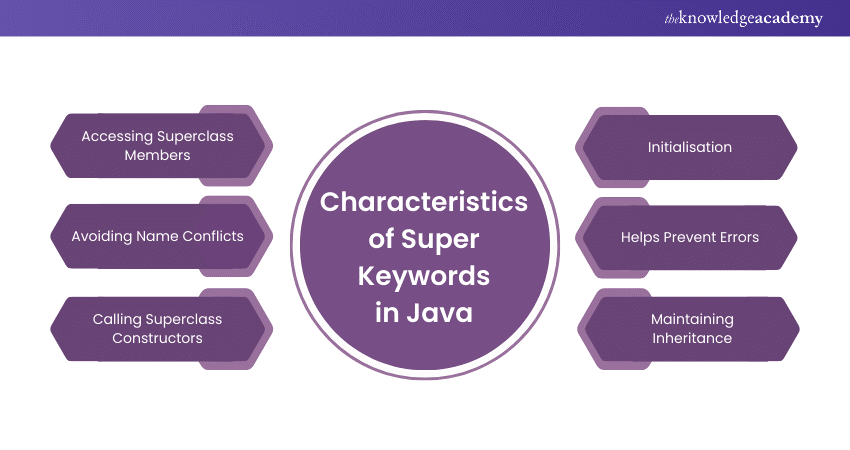We may not have the course you’re looking for. If you enquire or give us a call on +44 1344 203 999 and speak to our training experts, we may still be able to help with your training requirements.
Training Outcomes Within Your Budget!
We ensure quality, budget-alignment, and timely delivery by our expert instructors.

Have you ever wondered how subclasses in Java can access methods, variables, or constructors from their parent classes? Or how conflicts between similar methods in different classes are avoided? The answer lies in the powerful Super Keyword in Java. This simple yet vital feature allows seamless interaction between a subclass and its superclass.
But what makes the Super Keyword in Java truly indispensable? Whether it's invoking parent class constructors or calling overridden methods, super is the unsung hero that keeps inheritance running smoothly. If you're ready to level up your Java skills, mastering this tiny but mighty keyword is the key to writing cleaner, more efficient code!
Table of Contents
1) What is a Super Keyword in Java?
2) Characteristics of Super Keywords in Java
3) Usage of Java Super Keyword
4) Advantages of Using Java Super Keyword
5) Conclusion
What is a Super Keyword in Java?
The Super Keyword in Java is a reference variable that refers to the parent class. In order to understand the Super Keyword in Java, you must be familiar with the basic concepts of Inheritance and Polymorphism.
It is used to access the superclass constructor and to execute superclass methods. The Super Keyword is commonly used to avoid confusion between superclasses and subclasses that share method names.
Characteristics of Super Keywords in Java
The following are the characteristics of Super Keywords in Java:

1) Accessing Superclass Members
The Super Keyword allows you to access members (fields and methods) of the parent class. This is particularly useful when the subclass has members with the same name as those in the parent class.
2) Avoiding Name Conflicts
When a subclass has a field or method with the same name as one in its superclass, the Super Keyword helps to differentiate them, ensuring that the right name is accessed.
3) Calling Superclass Constructors
The Super Keyword is called by using the constructor of the parent class. This is essential for initialising the parent class’s fields and performing setup tasks.
4) Initialisation
Using super in constructors ensures that the parent class is properly initialised before the subclass adds its own initialisation.
5) Helps Prevent Errors
By explicitly calling superclass methods and constructors, the Super Keyword helps prevent errors that might arise from incorrect or incomplete initialisation.
6) Maintaining Inheritance
The Super Keyword helps maintain the integrity of inheritance by ensuring that the subclass can properly interact with and extend the functionality of the parent class.
Achieve Java Engineering excellence and propel your career forward with our tailored Java Engineer Training - sign up now!
Usage of Java Super Keyword
Here are the primary uses of the Super Keyword in Java:
1) Use of Super with Variables
When a subclass has a variable with the same name as the one in the parent class, super can be used to access the parent class variable.
Example:
|
class Animal { String type = "Wild Animal"; } class Dog extends Animal { String type = "Domestic Animal"; void printType() { System.out.println("Subclass type: " + type); System.out.println("Superclass type: " + super.type); } } public class Main { public static void main(String[] args) { Dog dog = new Dog(); dog.printType(); } } |
Output:
|
Subclass type: Domestic Animal Superclass type: Wild Animal |
2) Use of Super with Methods
You can use super to call the superclass method that has been overridden in the subclass.
Example:
|
class Animal { void sound() { System.out.println("Animals make different sounds."); } } class Dog extends Animal { @Override void sound() { super.sound(); // Calls the superclass method System.out.println("Dog barks."); } } public class Main { public static void main(String[] args) { Dog dog = new Dog(); dog.sound(); } } |
Output:
|
Animals make different sounds. Dog barks. |
3) Use of Super with Constructors
super() can be used to call the constructor of the superclass. This is useful when you want to initialise variables in the parent class when creating an object of the subclass.
Example:
|
class Animal { Animal() { System.out.println("Animal is created"); } } class Dog extends Animal { Dog() { super(); // Calls the superclass constructor System.out.println("Dog is created"); } } public class Main { public static void main(String[] args) { Dog dog = new Dog(); } } |
Output:
|
Animal is created Dog is created |
Elevate your career by mastering the Java Programming Course – join our course and become a coding expert!
Advantages of Using Java Super Keyword
The Super Keyword in Java offers several advantages, especially when working with inheritance and object-oriented programming. Here are the key benefits:

Here are the advantages of using the Java Super Keyword:
1) Accessing Hidden Variables: It allows access to parent class variables when they are hidden by subclass variables of the same name.
2) Calling Overridden Methods: Enables calling the original method from the superclass, even when it is overridden in the subclass.
3) Invoking Parent Class Constructors: Ensures the proper initialisation of parent class constructors, reducing code duplication and improving setup.
4) Code Reusability: Promotes the reuse of parent class methods, fields, and constructors, reducing redundancy and making code cleaner.
5) Maintaining Encapsulation: Allows access to parent class components while keeping subclass implementation separate, preserving encapsulation.
6) Facilitating Polymorphism: Supports method overriding, essential for runtime polymorphism, allowing flexible and dynamic code behaviour.
7) Improving Code Readability: Makes the code easier to understand by clearly showing access to superclass methods and variables.
Advance your career with our in-depth Java Courses – the ultimate step to becoming a sought-after Java Developer!
Conclusion
The Super Keyword in Java is an effective tool for accessing parent class methods, constructors, and variables, streamlining the inheritance process. Creating a direct link between child and parent classes enhances reusability and ensures a clean, structured codebase. Embrace it and elevate your coding game!
Elevate your skills with our Web Development Using Java Training – register now and become a Java web expert!
Frequently Asked Questions

No, the `super` keyword cannot be used in static methods. This is because static methods belong to the class itself, not to any specific object instance. The `super` keyword refers to instance members of a superclass.

Yes, you can override a method in the parent class and still use `super` to call it. The Super Keyword enables you to access the parent class's version of the overridden method.

The Knowledge Academy takes global learning to new heights, offering over 30,000 online courses across 490+ locations in 220 countries. This expansive reach ensures accessibility and convenience for learners worldwide.
Alongside our diverse Online Course Catalogue, encompassing 19 major categories, we go the extra mile by providing a plethora of free educational Online Resources like News updates, Blogs, videos, webinars, and interview questions. Tailoring learning experiences further, professionals can maximise value with customisable Course Bundles of TKA.

The Knowledge Academy’s Knowledge Pass, a prepaid voucher, adds another layer of flexibility, allowing course bookings over a 12-month period. Join us on a journey where education knows no bounds.

The Knowledge Academy offers various Java Courses, including Java Programming, JavaScript for Beginners, Java Engineer Training and Web Development Using Java Training. These courses cater to different skill levels, providing comprehensive insights into Java Developer Job Description.
Our Programming & DevOps Blogs cover a range of topics related to Java Programming, offering valuable resources, best practices, and industry insights. Whether you are a beginner or looking to advance your Programming skills, The Knowledge Academy's diverse courses and informative blogs have got you covered.
Upcoming Programming & DevOps Resources Batches & Dates
Date
 Java Programming
Java Programming
Mon 9th Dec 2024
Mon 6th Jan 2025
Mon 13th Jan 2025
Mon 20th Jan 2025
Mon 27th Jan 2025
Mon 3rd Feb 2025
Mon 10th Feb 2025
Mon 17th Feb 2025
Mon 24th Feb 2025
Mon 3rd Mar 2025
Mon 10th Mar 2025
Mon 17th Mar 2025
Mon 24th Mar 2025
Mon 7th Apr 2025
Mon 14th Apr 2025
Mon 21st Apr 2025
Mon 28th Apr 2025
Mon 5th May 2025
Mon 12th May 2025
Mon 19th May 2025
Mon 26th May 2025
Mon 2nd Jun 2025
Mon 9th Jun 2025
Mon 16th Jun 2025
Mon 23rd Jun 2025
Mon 7th Jul 2025
Mon 14th Jul 2025
Mon 21st Jul 2025
Mon 28th Jul 2025
Mon 4th Aug 2025
Mon 11th Aug 2025
Mon 18th Aug 2025
Mon 25th Aug 2025
Mon 8th Sep 2025
Mon 15th Sep 2025
Mon 22nd Sep 2025
Mon 29th Sep 2025
Mon 6th Oct 2025
Mon 13th Oct 2025
Mon 20th Oct 2025
Mon 27th Oct 2025
Mon 3rd Nov 2025
Mon 10th Nov 2025
Mon 17th Nov 2025
Mon 24th Nov 2025
Mon 1st Dec 2025
Mon 8th Dec 2025
Mon 15th Dec 2025
Mon 22nd Dec 2025







 Top Rated Course
Top Rated Course



 If you wish to make any changes to your course, please
If you wish to make any changes to your course, please


